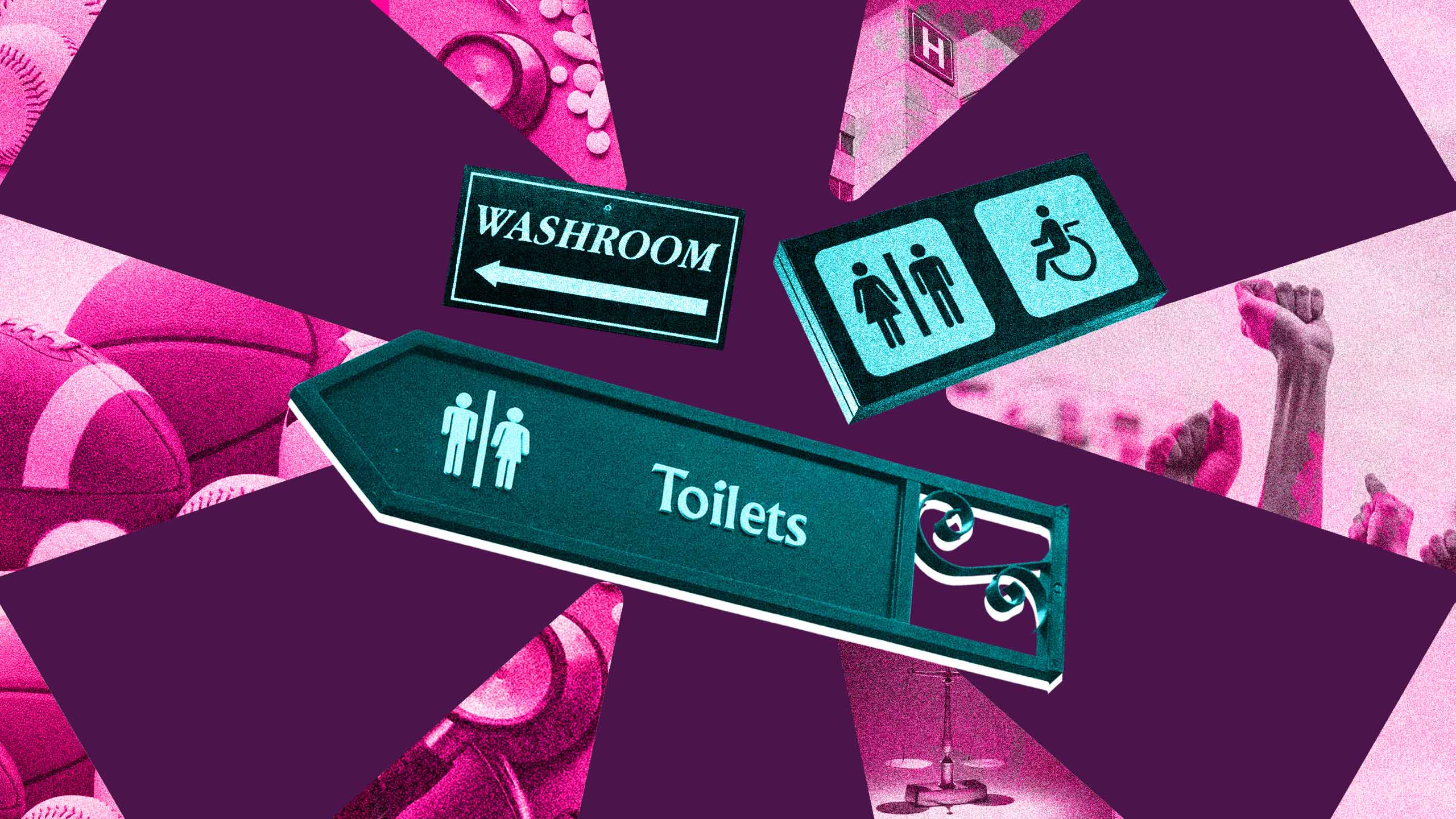Ever since the pandemic started, I’ve had to delay flying down to visit my parents in Florida with my kids. First, health concerns prevented our travel plans, and later, financial viability. But now a new set of circumstances have surfaced that will prevent my kids from visiting their grandparents’ tropical home: the state’s conservative legislature passed a bill preventing me from safely using public restrooms.
HB 1521, which passed last Wednesday, is, in plain terms, a bathroom bill. Under the new rules, trans people must use the bathroom associated with their assigned sex at birth in government buildings like schools, courthouses and airports. The bill’s passage is the latest development in the ongoing conservative freakout over trans people existing—and one that feels very personal to me.
Visiting my parents used to feel like a safe home away from home, especially in the harsh New England winter months like February. Now, the idea of it makes my stomach turn. I haven’t used a men’s room in seven years; I’m not going to endanger myself by doing so again now.
When I brought the new legislation up to my mom and mentioned that I would not visit her with her state operating under this bathroom bill, she was keen to find workarounds. She mentioned, for example, that we might just be able to plan around my bathroom usage by not travelling far from my parent’s home.
But I don’t want to rely on workarounds. First, they’re impractical—I can’t predict my bladder and I won’t be a servant to the length of time I can go between pisses. Second, these types of workarounds will doubtless push me, and any other trans person in the state, into unhealthy situations: if I knew I needed to avoid using public restrooms on a day out with my extended family, I would almost certainly try to restrict my food and liquid intake in order to maximize our time in public.
Doing so is something a lot of trans people were already doing to avoid having to use public restrooms—which were hostile spaces, even before states have stepped in and made them worse. Studies have shown that many trans people eat or drink less over the course of the day because of public bathroom anxiety.
A law like HB 1521 not only affects me: it also unnecessarily restricts the activities my loved ones and I do as a family. Want to take a trip to Disney World across the state in Orlando? Too bad. Want to catch a baseball or football game in Tampa or a soccer game in Miami? Out of the question.
These are typically fun activities for families, but trans bathroom panic puts a serious wrinkle in the works for families like mine. It only takes one transphobic idiot confronting me in a bathroom for an amazing family day out to turn into years of trauma for my kids. Sometimes, I think the potential risk of a confrontation isn’t worth taking in a lot of cases. I’ve never personally been confronted for using a women’s room, but the spectre of that possibility hangs over my head every time I leave my front door, and the anxiety multiplies when I have my kids in tow.
We’ve been down this road before as a society. Back in 2016 in North Carolina, when Republicans introduced HB 2, a bill which, like Florida, banned trans people from government bathroom facilities. Back then, the new law was the subject of hundreds, if not thousands, of headlines about how the legislation would harm trans people. News of the bill was featured on local and national television, and the outrage sparked by its passage prompted a national backlash.
A 2017 study estimated that boycotts against the law cost North Carolina USD $3.76 trillion in economic activity. PayPal cancelled plans for a new headquarters building in Charlotte. The NBA moved its All-Star Game out of the state and the NCAA banned sanctioned events from taking place there. The bill was eventually struck down in 2017.
A few weeks ago, I saw an allegedly liberal commentator on Twitter claim, erroneously, that the age of conservative bathroom bills was over and that questions over “more controversial topics” like youth transition care or trans athletes were more legitimate these days.
“Florida has finally done what North Carolina couldn’t. They passed a bathroom bill without the consequences of public outrage. ”
It was a hopelessly naive take. The bathroom bills never left. There were several already filed in conservative state legislatures when this guy made his comment. The dishonest discourse over trans youth and athlete issues is what led us back to the bathroom bills.
Now look around. Did you even hear about Florida’s bathroom bill passing last week? Florida has finally done what North Carolina couldn’t. They passed a bathroom bill without the consequences of public outrage. There will likely be no boycotts or media outrage over Florida’s bathroom bill. It has blended into the ongoing political discourse. It signals how successful conservative messaging has been on trans issues.
They’ve essentially browbeaten a largely cis voting population into submission and acquiescence. They’ve successfully painted trans personhood as “debateable” and “political.”
All I have left is personal resistance. I refuse to live as a second-class citizen in my parents’ state just because a bunch of crusty old politicians have an issue with my gender identity. I’ve visited the state myself probably a dozen times since my parents got their winter home there years ago, but Florida will not see another dollar of mine until this ridiculous law is someday repealed.


 Why you can trust Xtra
Why you can trust Xtra


